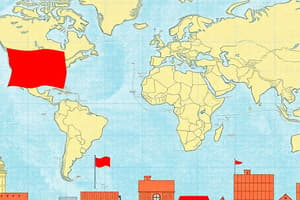Podcast
Questions and Answers
What is the basic principle that governs international trade?
What is the basic principle that governs international trade?
Supply and demand
When will a country export goods or services?
When will a country export goods or services?
When its domestic production exceeds its demand and the world price is higher than the local price.
What determines when a country will import goods or services?
What determines when a country will import goods or services?
When the world price is lower than the domestic price, or when demand in the domestic market exceeds domestic production.
Name three benefits of international trade.
Name three benefits of international trade.
How does specialization in production benefit countries participating in international trade?
How does specialization in production benefit countries participating in international trade?
What is one outcome of countries participating in international trade?
What is one outcome of countries participating in international trade?
What are some challenges posed by international trade according to the text?
What are some challenges posed by international trade according to the text?
How does international trade contribute to income inequality?
How does international trade contribute to income inequality?
What is the role of the World Trade Organization (WTO) in international trade?
What is the role of the World Trade Organization (WTO) in international trade?
Explain how currency fluctuations can impact a country's economy.
Explain how currency fluctuations can impact a country's economy.
What factors shape the future of international trade?
What factors shape the future of international trade?
Why is it important for countries to explore the benefits and challenges of international trade?
Why is it important for countries to explore the benefits and challenges of international trade?
Flashcards are hidden until you start studying
Study Notes
Exploring Economics: International Trade
International trade, a cornerstone of global economics, refers to the exchange of goods, services, and capital between countries. Through this exchange, the world's economies interact, intertwine, and foster growth, innovation, and shared prosperity.
The Basics of International Trade
International trade is governed by supply and demand, just like any other economic activity. A country will export goods or services if its domestic production exceeds its demand and the world price is higher than the local price. Conversely, it will import goods or services when the world price is lower than the domestic price, or when demand in the domestic market exceeds domestic production.
The Benefits and Challenges of International Trade
The benefits of international trade are numerous. They include:
- Efficiency and Competitiveness: By specializing in the production of goods or services in which a country has a comparative advantage, it can produce more efficiently and lower prices for consumers, benefiting both the exporting and importing countries.
- Increased Consumer Choice: International trade leads to greater variety of goods and services, allowing consumers to purchase more diverse products at potentially lower prices.
- Increased Wealth: As countries participate in international trade, their economies tend to grow, leading to increased wealth and standard of living.
- Technological Advances: Countries can learn from and adopt new technologies from other countries, leading to innovation and progress.
While international trade presents many benefits, it also poses challenges. These include:
- Job Losses: As countries import goods or services, local production may decline, leading to job losses in certain sectors.
- Income Inequality: The distribution of the benefits of international trade may be unequal, with some groups or regions benefiting more than others.
- Environmental Impact: International trade can lead to an increased consumption of natural resources and contribute to environmental degradation.
- Currency Fluctuations: The value of a country's currency can change as a result of its involvement in international trade, leading to potential economic instability.
Trade Agreements and Organizations
To foster international trade, governments and organizations have established numerous trade agreements and organizations. These agreements include:
- World Trade Organization (WTO): The WTO is an international organization that regulates trade between its member countries.
- Trade Agreements: There are numerous bilateral and multilateral trade agreements that reduce tariffs and other barriers to trade between countries.
These agreements and organizations aim to create a more open, transparent, and predictable environment for international trade.
The Future of International Trade
The future of international trade is shaped by a variety of factors, including technological advancements, changing consumer preferences, and evolving global politics. As countries continue to explore new opportunities for cooperation and collaboration, international trade is likely to remain a critical component of global economic development.
In conclusion, international trade is a complex and dynamic phenomenon that has the potential to drive economic growth, foster innovation, and connect the world's markets. As countries adjust to the ever-changing landscape of global trade, it is essential that we continue to explore the benefits and challenges of international trade, while also striving to create a more equitable and sustainable global economic system.
Studying That Suits You
Use AI to generate personalized quizzes and flashcards to suit your learning preferences.




